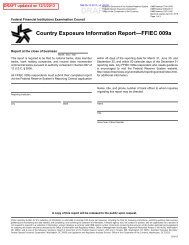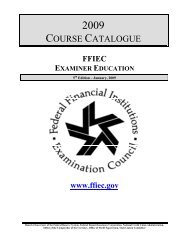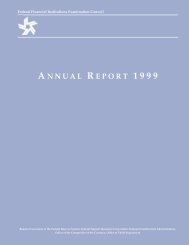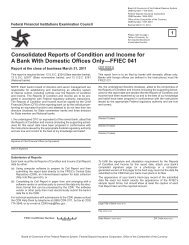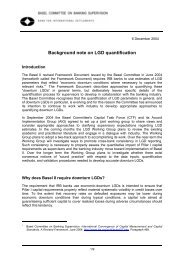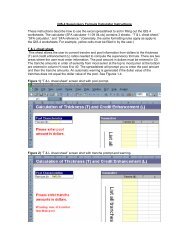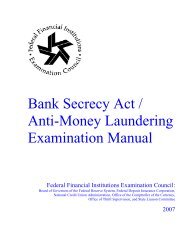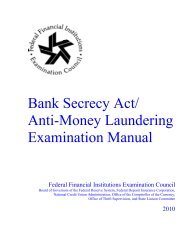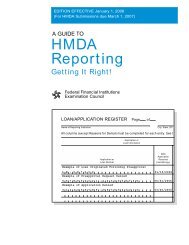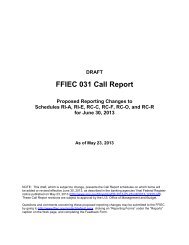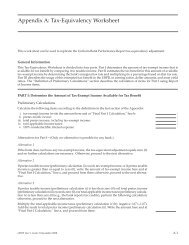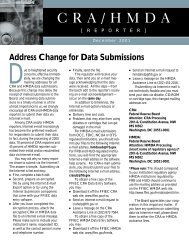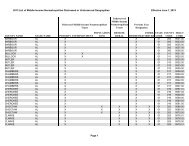Annual Report 2002 - ffiec
Annual Report 2002 - ffiec
Annual Report 2002 - ffiec
You also want an ePaper? Increase the reach of your titles
YUMPU automatically turns print PDFs into web optimized ePapers that Google loves.
THE FEDERAL FINANCIAL INSTITUTION REGULATORY AGENCIES<br />
AND THEIR SUPERVISED INSTITUTIONS<br />
The five federal regulatory agencies<br />
represented on the Council have<br />
primary federal supervisory jurisdiction<br />
over 19,573 domestically<br />
chartered banks, thrift institutions,<br />
and credit unions. On June 30, <strong>2002</strong>,<br />
these financial institutions held total<br />
assets of more than $9.5 trillion. The<br />
Board of Governors of the Federal<br />
Reserve System (FRB) and the<br />
Office of Thrift Supervision (OTS)<br />
also have primary federal supervisory<br />
responsibility for commercial<br />
bank holding companies and for<br />
savings and loan holding companies,<br />
respectively.<br />
The three banking agencies on the<br />
Council have authority to oversee<br />
the operations of U.S. branches and<br />
agencies of foreign banks. The International<br />
Banking Act of 1978 (IBA)<br />
authorizes the Office of the Comptroller<br />
of the Currency (OCC) to<br />
license federal branches and agencies<br />
of foreign banks and permits<br />
U.S. branches that accept only<br />
wholesale deposits to apply for<br />
insurance with the Federal Deposit<br />
Insurance Corporation (FDIC).<br />
According to the Federal Deposit<br />
Insurance Corporation Improvement<br />
Act of 1991 (FDICIA), foreign<br />
banks that wish to operate insured<br />
entities in the United States and<br />
accept retail deposits must organize<br />
under separate U.S. charters. Existing<br />
insured retail branches may<br />
continue to operate as branches.<br />
The IBA also subjects those U.S.<br />
offices of foreign banks to many<br />
provisions of the Federal Reserve<br />
Act and the Bank Holding Company<br />
Act. The IBA gives primary<br />
examining authority to the OCC,<br />
the FDIC, and various state authorities<br />
for the offices within their jurisdictions<br />
and gives the FRB residual<br />
examining authority over all U.S.<br />
banking operations of foreign<br />
banks.<br />
Board of Governors of the<br />
Federal Reserve System (FRB)<br />
The FRB was established in 1913. It<br />
is headed by a seven-member Board<br />
of Governors, each member of<br />
which is appointed by the President,<br />
with the advice and consent of the<br />
Senate, for a 14-year term. Subject<br />
to confirmation by the Senate, the<br />
President selects two Board members<br />
to serve four-year terms as<br />
Chairman and Vice Chairman. The<br />
FRB’s activities that are most relevant<br />
to the work of the Council are:<br />
• examining, supervising, and<br />
regulating state member banks<br />
(that is, state-chartered banks<br />
that are members of the Federal<br />
Reserve System); bank holding<br />
companies; Edge Act and agreement<br />
corporations; and in conjunction<br />
with the licensing<br />
authorities, the U.S. offices of foreign<br />
banks;<br />
• developing and issuing regulations,<br />
policies, and guidance<br />
applicable to organizations<br />
within the Federal Reserve's<br />
supervisory oversight authority;<br />
and<br />
• approving or denying applications<br />
for mergers, acquisitions,<br />
and changes in control by state<br />
member banks and bank holding<br />
companies, applications for foreign<br />
operations of member banks<br />
and Edge Act and agreement corporations,<br />
and applications by<br />
foreign banks to establish or<br />
acquire U.S. banks and to establish<br />
U.S. branches, agencies, or<br />
representative offices.<br />
Other supervisory and regulatory<br />
responsibilities of the Federal<br />
Reserve include regulating margin<br />
requirements on securities transactions,<br />
implementing certain statutes<br />
that protect consumers in credit and<br />
deposit transactions, monitoring<br />
compliance with other statutes, (for<br />
example, the money-laundering<br />
provisions of the Bank Secrecy Act),<br />
and regulating transactions between<br />
banking affiliates.<br />
Policy decisions are implemented<br />
by the FRB and the 12 Federal<br />
Reserve Banks, each of which has<br />
operational responsibility within a<br />
specific geographical area. The<br />
twelve Reserve Bank districts are<br />
headquartered in Boston, New<br />
York, Philadelphia, Cleveland,<br />
Richmond, Atlanta, Chicago, St.<br />
Louis, Minneapolis, Kansas City,<br />
Dallas, and San Francisco. Each<br />
Reserve Bank has a president and<br />
other officers. Among other responsibilities,<br />
a Reserve Bank employs a<br />
staff of bank examiners, who examine<br />
state member banks and Edge<br />
Act and agreement corporations,<br />
inspect bank holding companies,<br />
and examine the offices of foreign<br />
banks located within the Reserve<br />
Bank’s District.<br />
National banks, which must be<br />
members of the Federal Reserve<br />
System, are chartered, regulated,<br />
and supervised by the OCC. Statechartered<br />
banks may apply to and<br />
be accepted for membership in the<br />
Federal Reserve System, after which<br />
they are subject to the supervision<br />
and regulation of the Federal<br />
Reserve. Insured state-chartered<br />
banks that are not members of the<br />
Federal Reserve System are regulated<br />
and supervised by the FDIC.<br />
The Federal Reserve has overall<br />
responsibility for foreign banking<br />
operations, including both U.S.<br />
banks operating abroad and foreign<br />
banks operating branches in the<br />
United States.<br />
The Federal Reserve covers the<br />
expenses of its operations with<br />
17



